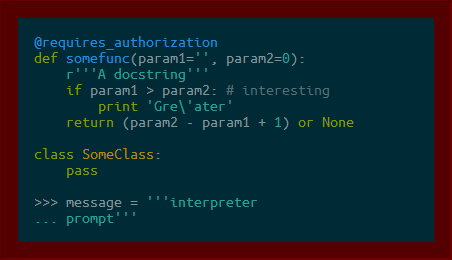Month: July 2014
Joda-Time: Date and time API for Java
We’re still using Java 6 for our apps at work. Recently I needed to compute the number of days between 2 dates. It turns out that it’s a non–trivial problem. We’re using JBoss Seam as our web development framework, so I ended up using the Joda-Time packaged with Seam to do the computation. It’s a lovely API and much cleaner than the standard Java API.
Consul: Distributed service registry & key/value data store
Devstep: Build a dev environment from a single command using git & docker
highlight.js: JavaScript syntax highlighting library with automatic language detection and support for 86 languages
From the highlight.js home page:
- 86 languages and 49 styles
- automatic language detection
- multi-language code highlighting
- available for node.js
- works with any markup
- compatible with any js framework
lunr.js: JavaScript, client-side, full text search engine inspired by Solr
lunr.js is a simple full text search engine for your client side applications. It is designed to be small, yet full featured, enabling you to provide a great search experience without the need for external, server side, search services.
lunr.js has no external dependencies, although it does require a modern browser with ES5 support. In older browsers you can use an ES5 shim, such as augment.js, to provide any missing JavaScript functionality.
“Load Balancing with HAProxy”
http://serversforhackers.com/editions/2014/07/15/haproxy/
A good primer on the open source load-balancer, HAProxy.
“Bitly: Lessons Learned Building A Distributed System That Handles 6 Billion Clicks A Month”
NuTTY: SSH Terminal sharing using the Chrome web browser
Link: A 30-minute Introduction to Rust (Tutorial)
http://doc.rust-lang.org/master/intro.html
From the tutorial:
Rust is a systems programming language that combines strong compile-time correctness guarantees with fast performance. It improves upon the ideas of other systems languages like C++ by providing guaranteed memory safety (no crashes, no data races) and complete control over the lifecycle of memory. Strong memory guarantees make writing correct concurrent Rust code easier than in other languages. This tutorial will give you an idea of what Rust is like in about thirty minutes. It expects that you’re at least vaguely familiar with a previous ‘curly brace’ language, but does not require prior experience with systems programming. The concepts are more important than the syntax, so don’t worry if you don’t get every last detail: the tutorial can help you out with that later.







